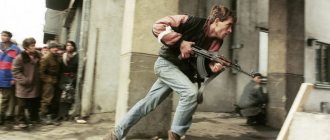Article 189 of the Criminal Code of the Russian Federation establishes criminal liability for illegal export from the Russian Federation or transfer of raw materials, materials, equipment, technologies, scientific data, illegal provision of services (or performance of work) that can be used in the creation of weapons of mass destruction, weapons and military equipment. The appearance of this article in the Criminal Code of the Russian Federation is quite justified: the uncontrolled proliferation of weapons negatively affects the provision of the national interests of the state, creates the risk of them falling into the hands of terrorist organizations, which, in turn, negatively affects the security of mankind. This crime is rarely recorded in the Russian Federation: for example, according to the Judicial Department under the RF Armed Forces, in 2022 one person was convicted under Article 189 of the Criminal Code of the Russian Federation.
Let's consider the elements of the crime provided for in Part 1 of Article 189 of the Criminal Code of the Russian Federation
- An object
. The procedure established by law for the export or transfer of raw materials, materials, equipment that can be used in the manufacture of weapons of mass destruction, weapons and military equipment. An additional object is the relationship that ensures the obligations of the Russian Federation on the non-proliferation of weapons of mass destruction.
Subjects of the crime:
- raw materials - substances of natural origin that are the main components in the creation of weapons;
materials – components of weapons or military equipment;
- equipment - devices that allow you to process raw materials into the final product;
- technology – an array of special knowledge that allows one to develop, create, and use weapons, equipment, and means of mass destruction;
- scientific and technical information – material media containing data on the stages of development, production, and use of the equipment indicated above;
- weapons and military equipment are a complex of various types of weapons and means of their use (including means of delivery, guidance, launch, etc.).
- Objective side
. Includes a variety of actions:
- export of raw materials, equipment, materials, machinery abroad without the possibility of return;
transfer abroad of the above items;
- performing work or providing services, which may include, for example, illegal consulting, training, advanced training, design, development of devices, etc.
- Subject
. A sane individual who has reached the age of 16 years. However, judicial practice shows that these crimes are committed, as a rule, by the heads of commercial organizations or individual entrepreneurs. - Subjective side
. Guilt in the form of direct intent.
“Article 189 of the Criminal Code of the Russian Federation refers to a large number of regulations governing this area. For example, the export procedure is regulated by Decrees of the President of the Russian Federation No. 1661 of December 17, 2011 and No. 1005 of August 8, 2001, and the main provisions related to export control are contained in Federal Law No. 183 of July 18, 1999.”
Circumstances that increase criminal liability are:
- committing an act as part of a group of individuals by prior conspiracy;
- committing an act as part of an organized group of individuals;
- carrying out the previously specified actions in relation to raw materials, equipment, materials, technologies that the guilty person knows can be used in the manufacture of weapons of mass destruction, their means of delivery, and in respect of which export control has been established.
Commentary to Art. 189 Criminal Code
1. A socially dangerous act can be expressed by one of the following actions: a) illegal export, i.e. export outside Russia of raw materials, materials, equipment, technologies, scientific and technical information without the obligation to re-import, which can be used in the creation of weapons and military equipment and in respect of which export control has been established; b) transfer of the same items to a foreign organization or its representative without their removal from the territory of Russia; c) performing work for a foreign organization or its representative, both within Russia and abroad, that can be used in the creation of weapons and military equipment and in respect of which export control has been established; d) provision of services to a foreign organization or its representative, both within Russia and abroad, that can be used in the creation of weapons and military equipment and in respect of which export control has been established.
The Decree of the President of the Russian Federation, on the recommendation of the Government of the Russian Federation, establishes: a) a list of goods, works, services, results of intellectual activity, the export of which is controlled; b) the procedure for implementing export control; c) a list of states to which the transfer of military products is permitted.
2. If the subject of the crime contains information constituting a state secret and is transferred to a foreign state, a foreign organization or their representatives for carrying out hostile activities to the detriment of the external security of Russia, or if, although it is not a state secret, it is also transferred for use to the detriment of the external security of Russia , then liability arises under Art. 275 of the Criminal Code.
3. Illegal export of technologies, scientific and technical information constituting state secrets, carried out by a person to whom this information was entrusted or became known through his service (or work), in the absence of signs of treason, is qualified under Art. 283 CC.
4. When delineating Art. 189 from Art. 226.1 of the Criminal Code, you need to pay attention to the fact that: a) smuggling is not only export, but also illegal import; b) into contraband, in contrast to the crime provided for in Art. 189 of the Criminal Code, does not include scientific and technical information, work, services; c) the essence of smuggling is the illegal movement of goods across the customs border, while in the case of illegal export of goods listed in Art. 189 of the Criminal Code, special export control rules related to quotas, licensing, etc. are violated. Therefore, when smuggling goods under Art. 189 of the Criminal Code, and, accordingly, in the absence of a license to carry out such activities, liability should arise only under Art. 188 of the Criminal Code.
Important!
In its composition, Article 189 of the Criminal Code of the Russian Federation is very similar to Article 226.1 of the Criminal Code of the Russian Federation, which establishes liability for smuggling. However, there are also differences. For example, the subject of contraband is broader than the subject of the crime provided for in Article 189 of the Criminal Code of the Russian Federation. Moreover, the last article states that the subject of smuggling is not raw materials, materials, scientific and technical information, technologies that can be used in the creation of weapons of mass destruction, weapons and military equipment. However, in practice, questions often arise as to which particular article to apply when transporting prohibited materials across the border of the Russian Federation.
The relationship between Art. 188 of the Criminal Code of the Russian Federation (Smuggling) and Art. 189 of the Criminal Code of the Russian Federation
FEDERAL AGENCY FOR EDUCATION
URAL STATE LAW ACADEMY
DEPARTMENT OF CRIMINAL LAW
COURSE WORK
on the subject “Responsibility for economic crimes” on the topic:
- The relationship between Art. 188 of the Criminal Code of the Russian Federation (Smuggling) and Art. 189 of the Criminal Code of the Russian Federation (Illegal export or transfer of raw materials, materials, equipment, technologies, scientific and technical information, illegal performance of work (provision of services) that can be used in the creation of weapons of mass destruction, weapons and military equipment)
Completed by: student of group 410
Khoyutanov G.V.
Checked by: Ph.D., Associate Professor
Savelyev D.A.
Ekaterinburg, 2006
- § 1. Art. 188 of the Criminal Code of the Russian Federation……………………………5
- § 2. Art. 189 of the Criminal Code of the Russian Federation……………………………10
- Chapter 2. Correlation of crimes provided for in Art. 188 and 189 of the Criminal Code of the Russian Federation…………14
- Conclusion……………………………………………………23
- List of used literature……………25
INTRODUCTION
The success of combating crimes in the field of foreign economic activity largely depends on the actual social danger of the acts, the quality of the laws, their compliance with the realities of life, as well as clarity, clarity, consistency, “transparency” for law enforcement officials, the absence of reasons for ambiguous interpretation, the correct definition of qualifying criteria, proportionality sanctions for the crime, etc.
Foreign trade relations between countries are gaining momentum, especially today, when Russia is on the verge of joining the World Trade Organization. Along with such positive aspects as economic integration and price liberalization, we are faced with the other side of the coin: the development of international crime. An indicator of recent phenomena in society is the increase in crimes in the customs sphere.
Based on the foregoing, it should be recognized that one of the current trends in the development of criminal law at present is the improvement of crimes in the field of foreign economic activity, the elimination of contradictions, gaps, and the “identification” of each article with its direct object. It is necessary to follow the path of ensuring the real application of legislation, which would affect the effectiveness of law enforcement agencies.
This work is aimed at identifying and studying aspects of the interaction of the crimes of “Smuggling” and “Illegal export or transfer of raw materials, materials, equipment, technologies, scientific and technical information, illegal performance of work (provision of services), which can be used in the creation of weapons of mass destruction , weapons and military equipment."
The development of this problem is one of the contents of criminal legal measures to combat crime in the field of foreign economic activity1.
Chapter 1. General characteristics of Articles 188 and 189 of the Criminal Code of the Russian Federation
§1. Smuggling (Article 188 of the Criminal Code of the Russian Federation)
The public danger of smuggling is determined by the fact that this act causes significant damage to foreign economic activity, which is important for the development of the economy of the Russian Federation. In addition, smuggling can cause great damage to public safety, public morals, human life and health and other law-protected interests when illegally moving across the customs border items prohibited in civil circulation, for example, narcotic drugs, potent, poisonous, poisonous or explosive substances, firearms weapons, ammunition, etc.
In accordance with Art. 19 of the Customs Code of the Russian Federation, all persons on an equal basis have the right to import into and export from the Russian Federation goods and vehicles, including when carrying out foreign economic activity, in the manner prescribed by the Customs Code. No one can be deprived of this right or limited in it, with the exception of cases provided for by the Customs Code and other legislative acts of the Russian Federation.
The import into and export from the Russian Federation of certain goods and vehicles may be prohibited for reasons of state security, protection of public order, morality of the population, human life and health, protection of animals and plants, protection of the natural environment, protection of artistic, historical and archaeological heritage of the peoples of Russia and foreign countries, protection of property rights, including intellectual property rights, protection of the interests of Russian consumers of imported goods and based on other interests of the country on the basis of acts of legislation of the Russian Federation and international treaties of the Russian Federation (Article 20 of the Labor Code).
The direct target of smuggling is the financial system of the state. Subject: goods and other items, with the exception of those listed in Part 2 of Art. 188 of the Criminal Code of the Russian Federation. The item must be on a large scale: the cost of goods and other items must exceed 250 thousand rubles (note Article 169 of the Criminal Code of the Russian Federation). According to clause 1, part 1, article 11 of the Customs Code of the Russian Federation, a commodity is any movable property moved across the customs border, as well as vehicles classified as immovable things moved across the customs border. The goods do not include the following vehicles: any sea (river) vessel (including self-propelled and non-self-propelled lighters and barges, as well as hydrofoils), hovercraft, aircraft, motor vehicles (including trailers, semi-trailers and combined vehicles ) or a unit of railway rolling stock that is used in international transportation for paid transportation of persons or for paid or free industrial or commercial transportation of goods, as well as their standard spare parts, accessories and equipment (clause 5, part 1, article 11 of the Labor Code of the Russian Federation) .
The territory of the Russian Federation constitutes the single customs territory of the Russian Federation. The customs territory of the Russian Federation also includes artificial islands, installations and structures located in the exclusive economic zone of the Russian Federation and on the continental shelf of the Russian Federation, over which the Russian Federation exercises jurisdiction in accordance with the law (Parts 1, 2, Article 2 of the Labor Code of the Russian Federation). The customs border also includes the perimeters of free customs zones and free warehouses (Article 37 of the Federal Law “On Special Economic Zones in the Russian Federation” dated July 22, 2005).
The objective side is the formal composition. The act consists of moving items across the customs border of the Russian Federation. The movement of goods and (or) vehicles across the customs border means the commission of actions for the import into the customs territory of the Russian Federation or the export from this territory of goods and (or) vehicles in any way (clause 7, part 1, article 11 of the Labor Code of the Russian Federation). Import of items - the actual crossing of goods and (or) vehicles of the customs border and all subsequent actions before their release by customs authorities; export of items - filing a customs declaration or taking actions directly aimed at exporting goods and (or) vehicles, as well as all subsequent actions before they actually cross the customs border (clauses 8, 9, part 1, article 11 of the Labor Code of the Russian Federation). In addition to the act, a mandatory sign of the objective side is the method:
- In addition to customs control. Customs control is a set of measures carried out by customs authorities in order to ensure compliance with the customs legislation of the Russian Federation (clause 19, part 1, article 11 of the Labor Code of the Russian Federation). The concept “besides” means the movement of the subject of a crime outside the place and time determined by the customs authorities.
- Concealment from customs control: concealment of the subject of a crime, committed both with the use of hiding places and without them (for example, relying on the inattention of customs officers).
- Fraudulent use of documents or means of customs identification: presentation to customs control of obviously forged documents, documents obtained illegally, as well as containing false information or relating to other goods, use of means of customs control (falsification of seals, stamps, identification marks, etc.).
- Non-declaration or false declaration occurs if, during customs clearance, the necessary information is not provided or false information about the goods or other items being transported is provided.
The moment the crime ends is either the fact of crossing the customs border of the Russian Federation (when importing goods into the customs territory of the Russian Federation in addition to customs control), or filing a customs declaration or other action aimed at realizing the intention to export the item (when exporting goods from the customs territory of the Russian Federation or transporting goods in another way ).
General subject of the crime: a sane individual who has reached the age of 16 years. The subjective side is characterized by direct intent.
The objective side of the crimes provided for in Part 1 and Part 2 of Art. 188 of the Criminal Code, coincides completely, with the exception of the size of the transported valuables and the item. The subject of smuggling, punishable under Part 2, are items for which special rules have been established for movement across the border of the Russian Federation: narcotic drugs; psychotropic substances; potent; poisonous; poisonous; explosives; radioactive; etc. According to Part 1, the movement must occur on a large scale.
Actions related to the illegal trafficking of narcotic drugs, psychotropic, potent and toxic substances, as well as drug-containing plants or their parts, when illegally moving these drugs, substances and plants across the customs border of the Russian Federation, are subject to qualification under Art. 228, 228.1, 234, depending on the composition and Article 188 of the Criminal Code of the Russian Federation (clause 19 of the Resolution of the Plenum of the Supreme Court of the Russian Federation of May 27, 1998 N 9 “On judicial practice in cases of crimes related to narcotic drugs, psychotropic, potent and toxic substances")2. Smuggling and subsequent illegal acquisition, transfer, sale, storage, transportation or carrying of weapons, their main parts, ammunition, explosives and explosive devices - Art. 188 and 222 of the Criminal Code of the Russian Federation.
Part 3 contains qualifying characteristics for both types of smuggling:
1) commission of an act by an official using his official position - paragraph “b” of Part 3 of Art. 188 CC;
2) committing an act with the use of violence against a person exercising customs control - clause “c” of Part 3 of Art. 188 of the Criminal Code.
Part 4 provides for tougher punishment if smuggling is committed by an organized group.
- § 2. Illegal export or transfer of raw materials, materials, equipment, technologies, scientific and technical information, illegal performance of work (provision of services) that can be used in the creation of weapons of mass destruction, weapons and military equipment (Article 189 of the Criminal Code of the Russian Federation)
The social danger of the crime in question lies in the violation of the norms of international and national legislation on the non-proliferation of weapons of mass destruction and the norms of national legislation regulating the export of weapons and military equipment. As a result of the commission of this crime, the peace and security of mankind, national security, political, economic or military interests of the Russian Federation may suffer3.
The direct object of this crime is the procedure for carrying out foreign economic activities aimed at preventing the proliferation of weapons and military equipment. The subject is: raw materials; materials; equipment; technologies; scientific and technical information.
All these items must simultaneously have the following characteristics:
1) they can be used in the creation of weapons and military equipment (Part 1 of Article 189 of the Criminal Code) or weapons of mass destruction, their delivery vehicles (Part 3 of Article 189 of the Criminal Code);
2) export controls must be established in relation to them.
Raw materials are substances and materials of natural origin that serve as the main component in the creation of weapons and military equipment or weapons of mass destruction, and their means of delivery. The materials combine the remaining components of the created weapons and military equipment or weapons of mass destruction, and their delivery vehicles. Equipment is specially created systems and devices that make it possible to process initial components (raw materials and materials) using appropriate technologies into the final product - weapons and military equipment or weapons of mass destruction, their means of delivery. Technologies are understood as the entire set of special information that is required for the development, production and use (application) of any type of weapons and military equipment or weapons of mass destruction, and their means of delivery. Scientific and technical information includes material media of information (drawings, copies, originals of various documents, prototypes, diagrams, diagrams, models, etc.) about any stages of the development, production and use of weapons and military equipment or weapons of mass destruction, their means of delivery4.
Punishments under Article 189 of the Criminal Code of the Russian Federation
Alternative sanctions under Article 189 of the Criminal Code of the Russian Federation:
- a fine from 100 to 500 thousand rubles (or in the amount of the convicted person’s earnings for a period of 1 to 3 years);
- up to 5 years of ban on holding certain positions (ban on carrying out certain types of activities);
- up to 3 years of forced labor;
- up to 3 years in prison.
If there are aggravating circumstances, the punishment, of course, increases. For example, for committing a crime as part of an organized group, an individual may face a prison term of 3 to 7 years. As an additional sanction, a fine of up to 1 million rubles (or in the amount of the income of the convicted person for a period of up to 5 years) may be applied.
Judicial practice under Article 189 of the Criminal Code of the Russian Federation
Appeal ruling of the Judicial Collegium for Criminal Cases of the Supreme Court of the Russian Federation dated March 14, 2019 N 5-APU19-10
to the competent authorities of the Republic of Kazakhstan for criminal prosecution under Part 3 of Art. , clause 2, part 4, art. 189 of the Criminal Code of the Republic of Kazakhstan were left without satisfaction, and the said decision of the Deputy Prosecutor General of the Russian Federation was recognized as legal and justified. Having heard the report of the judge of the Supreme Court of the Russian Federation E.B. Erdyniev, the speech of Ertaev Zh.Zh., lawyers Karpinsky R.S. and Petrova A.A. on the arguments of the appeal, speech by prosecutors Terekhova S.P., Klykovsky S.A., who objected to the arguments of the appeal, Judicial Collegium
Appeal ruling of the Judicial Collegium for Criminal Cases of the Supreme Court of the Russian Federation dated August 15, 2019 N 67-APU19-9
It is not clear from the record of the court session that during the interrogation of witness K. by state prosecutor L.A. Orlova. the provisions of Part 2 of Art. 189 of the Criminal Code of the Russian Federation. The court complied with the requirements of Art. 15 Code of Criminal Procedure of the Russian Federation. The statement of A.Yu. Komarov is untenable. about the court’s distortion in the verdict of D.’s testimony regarding his participation in organizing a procession called “Russian March” along a certain route.
Appeal ruling of the Judicial Collegium for Criminal Cases of the Supreme Court of the Russian Federation dated September 12, 2018 N 18-APU18-18
01/27/2015 Gontar M.M. was recognized as a suspect under Part 4 of Art. 189 of the Criminal Code of the Republic of Kazakhstan and was interrogated in this status. 02.22.2016 actions Gontar M.M. law enforcement agencies of the Republic of Kazakhstan have been reclassified to paragraph “b” of Part 4 of Art. 177 of the Criminal Code of the Republic of Kazakhstan (as amended by the law dated July 16, 1997) - fraud, that is, the theft of someone else’s property through deception and abuse of trust, on an especially large scale.
Appeal ruling of the Judicial Collegium for Criminal Cases of the Supreme Court of the Russian Federation dated November 20, 2018 N 5-APU18-78
The Investigation Department of the General Prosecutor's Office of the Republic of Kazakhstan is investigating a criminal case against K.V. Sviridov. in committing crimes under Art. 250, paragraph 1, part 3, art. 189 of the Criminal Code of the Republic of Kazakhstan. On May 13, 2017, the accused was put on the wanted list and detained on the territory of the Russian Federation on August 1, 2022.







